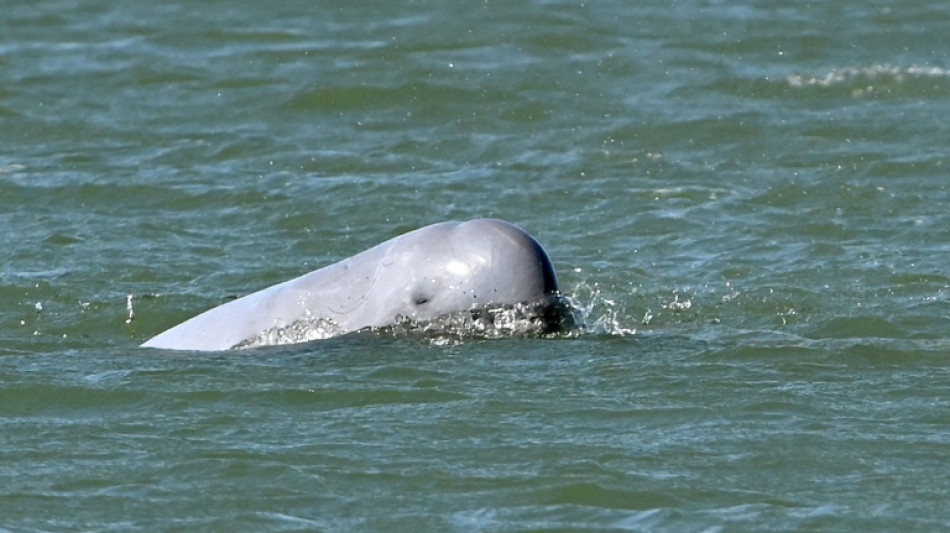
-
 Israeli president says 'we will overcome evil' at Bondi Beach
Israeli president says 'we will overcome evil' at Bondi Beach
-
Munsey leads Scotland to 207-4 against Italy at T20 World Cup

-
 Japan restarts world's biggest nuclear plant again
Japan restarts world's biggest nuclear plant again
-
Bangladesh poll rivals rally on final day of campaign

-
 Third impeachment case filed against Philippine VP Duterte
Third impeachment case filed against Philippine VP Duterte
-
Wallaby winger Nawaqanitawase heads to Japan

-
 Thailand's Anutin rides wave of nationalism to election victory
Thailand's Anutin rides wave of nationalism to election victory
-
Venezuela's Machado says ally kidnapped by armed men after his release

-
 Maye longs for do-over as record Super Bowl bid ends in misery
Maye longs for do-over as record Super Bowl bid ends in misery
-
Seahawks' Walker rushes to Super Bowl MVP honors

-
 Darnold basks in 'special journey' to Super Bowl glory
Darnold basks in 'special journey' to Super Bowl glory
-
Japan's Takaichi may struggle to soothe voters and markets

-
 Seahawks soar to Super Bowl win over Patriots
Seahawks soar to Super Bowl win over Patriots
-
'Want to go home': Indonesian crew abandoned off Africa demand wages

-
 Asian stocks track Wall St rally as Tokyo hits record on Takaichi win
Asian stocks track Wall St rally as Tokyo hits record on Takaichi win
-
Bad Bunny celebrates Puerto Rico in joyous Super Bowl halftime show

-
 Three prominent opposition figures released in Venezuela
Three prominent opposition figures released in Venezuela
-
Israeli president says 'we shall overcome this evil' at Bondi Beach

-
 'Flood' of disinformation ahead of Bangladesh election
'Flood' of disinformation ahead of Bangladesh election
-
Arguments to begin in key US social media addiction trial

-
 Agronomics Limited Announces Net Asset Value Calculation as at 31 December 2025
Agronomics Limited Announces Net Asset Value Calculation as at 31 December 2025
-
UK-Based Vesalic Limited Emerges from Stealth with Landmark Discovery of Potential Non-CNS Driver of Motor Neuron Diseases, including ALS, and Breakthrough Therapeutic and Diagnostic Opportunities

-
 Gotterup tops Matsuyama in playoff to win Phoenix Open
Gotterup tops Matsuyama in playoff to win Phoenix Open
-
New Zealand's Christchurch mosque killer appeals conviction

-
 Leonard's 41 leads Clippers over T-Wolves, Knicks cruise
Leonard's 41 leads Clippers over T-Wolves, Knicks cruise
-
Trump says China's Xi to visit US 'toward the end of the year'

-
 Real Madrid edge Valencia to stay on Barca's tail, Atletico slump
Real Madrid edge Valencia to stay on Barca's tail, Atletico slump
-
Malinin keeps USA golden in Olympic figure skating team event

-
 Lebanon building collapse toll rises to 9: civil defence
Lebanon building collapse toll rises to 9: civil defence
-
Real Madrid keep pressure on Barca with tight win at Valencia

-
 PSG trounce Marseille to move back top of Ligue 1
PSG trounce Marseille to move back top of Ligue 1
-
Hong Kong to sentence media mogul Jimmy Lai in national security trial

-
 Lillard will try to match record with third NBA 3-Point title
Lillard will try to match record with third NBA 3-Point title
-
Vonn breaks leg as crashes out in brutal end to Olympic dream

-
 Malinin enters the fray as Japan lead USA in Olympics team skating
Malinin enters the fray as Japan lead USA in Olympics team skating
-
Thailand's Anutin readies for coalition talks after election win

-
 Fans arrive for Patriots-Seahawks Super Bowl as politics swirl
Fans arrive for Patriots-Seahawks Super Bowl as politics swirl
-
'Send Help' repeats as N.America box office champ

-
 Japan close gap on USA in Winter Olympics team skating event
Japan close gap on USA in Winter Olympics team skating event
-
Liverpool improvement not reflected in results, says Slot

-
 Japan PM Takaichi basks in election triumph
Japan PM Takaichi basks in election triumph
-
Machado's close ally released in Venezuela

-
 Dimarco helps Inter to eight-point lead in Serie A
Dimarco helps Inter to eight-point lead in Serie A
-
Man City 'needed' to beat Liverpool to keep title race alive: Silva

-
 Czech snowboarder Maderova lands shock Olympic parallel giant slalom win
Czech snowboarder Maderova lands shock Olympic parallel giant slalom win
-
Man City fight back to end Anfield hoodoo and reel in Arsenal

-
 Diaz treble helps Bayern crush Hoffenheim and go six clear
Diaz treble helps Bayern crush Hoffenheim and go six clear
-
US astronaut to take her 3-year-old's cuddly rabbit into space

-
 Israeli president to honour Bondi Beach attack victims on Australia visit
Israeli president to honour Bondi Beach attack victims on Australia visit
-
Apologetic Turkish center Sengun replaces Shai as NBA All-Star


The battle to save Cambodia's river dolphins from extinction
Bulging grey heads break the turbid waters of the Mekong River in Cambodia as a pod of rare Irrawaddy dolphins surfaces to breathe, drawing excited murmurs from tourists watching from nearby boats.
The thrilling sight may soon be no more than a memory, as numbers of the endangered mammals dwindle despite efforts to preserve them.
Cambodia has announced tough new restrictions on fishing in the vast river to try and reduce the number of dolphins killed in nets.
But in a country with limited financial resources, it's a huge challenge to enforce the rules on a river hundreds of metres wide that is dotted with islets and lined with dense undergrowth.
"We fear we cannot protect them," says river guard Phon Pharong during a patrol searching for illegal gillnets.
Gillnets -- vertical mesh nets left in the water for long periods -- trap fish indiscriminately and are the main cause of death for dolphins in the Mekong, according to conservationists.
Pharong is one of more than 70 guards who patrol a 120-kilometre (75-mile) stretch of the Mekong from northeastern Kratie province to close to the Laos border.
The guards say their efforts are hampered by limited resources -- and intimidation by fishing gangs.
Mok Ponlork, a fisheries department official who leads the dolphin conservation guards in Kratie, has 44 people to monitor an 85-kilometre stretch but says to do the job effectively he would need at least 60.
Without the staffing, the guards know they are playing a losing game of cat and mouse with those fishing the river.
"If we patrol at night, they don't go. When we return at daytime, they go in the river," Pharong said.
Low wages mean guards are forced to take extra work onshore to support their families, taking them away from patrol duties.
Each guard receives about $65 a month from the government, while WWF funds another $5 for a day of patrolling.
- Dwindling numbers -
Irrawaddy dolphins -- small, shy creatures with domed foreheads and short beaks -- once swam through much of the mighty Mekong, all the way to the delta in Vietnam.
Illegal fishing and plastic waste have killed many, and the dolphins' habitat has been reduced by upstream dams and climate change, which have had a major impact on water levels in the river.
The population in the Mekong has dwindled from 200, when the first census was taken in 1997, to just 89 in 2020.
The species lives in only two other rivers: Myanmar's Ayeyarwady and the Mahakam in Indonesia, according to WWF.
The three river populations are listed as critically endangered on the IUCN red list of threatened species.
Found in fresh and salt water, Irrawaddy dolphins are slightly more numerous in coastal areas of South and Southeast Asia -- though even there they are classed as endangered.
Adding to concerns about the Mekong dolphins' future, around 70 percent of the population is now too old to breed.
Eleven Mekong dolphins died last year, but in December the deaths of three healthy breeding-aged dolphins entangled in fishing nets and lines within a week raised particular alarm among conservationists.
"It's kind of a worrying sign," Seng Teak, WWF-Cambodia Country Director, told AFP.
"We do need a lot in order to make sure that this species continues to survive in the Mekong," he said, calling on the government "to mobilise more resources into dolphin protection".
- Protection zones -
In late February, Cambodian Prime Minister Hun Sen issued a new law creating protection zones in which fishing is banned.
Violators face up to a year in jail for using gillnets and up to five years for electrofishing in the conservation areas.
In one such zone, around the village of Kampi, 24 guards now patrol a 22-square-kilometre (8.5-square-mile) stretch of river 24 hours a day.
"If they lay gillnets in the conservation zones, we will arrest them. If they use electrofishing, there is no mercy, they will be arrested and sent to court," said Ponlork.
So far, the extra push seems to be paying off: there are no more deaths and even a ray of hope.
"We got news from tourist boat operators that a baby dolphin was born a few days ago," Ponlork said.
Many locals who make a living taking tourists to see dolphins or selling related souvenirs are also worried about the mammals' future.
"If the dolphins are gone, we are over because our income is from dolphins," said Meas Mary, 53, who makes up to $15 a day running boat trips.
"Before there were a lot of dolphins. Now they are disappearing. I am so worried."
A.Rodriguezv--AMWN



